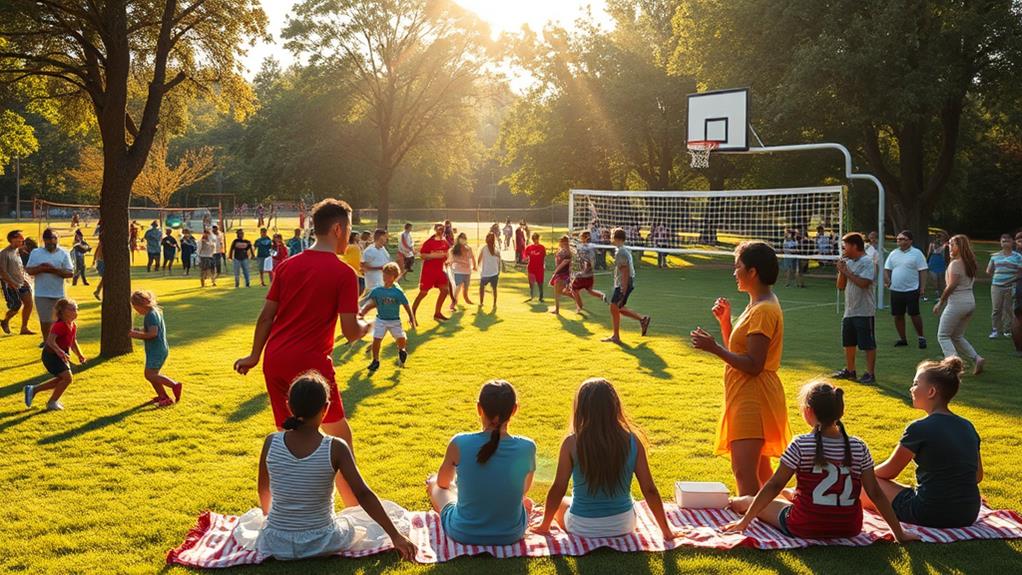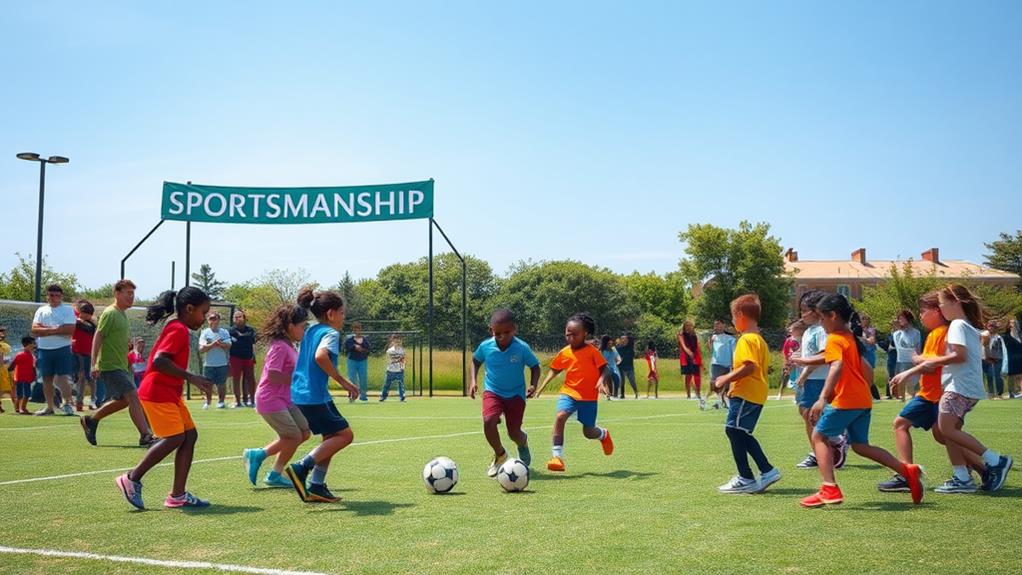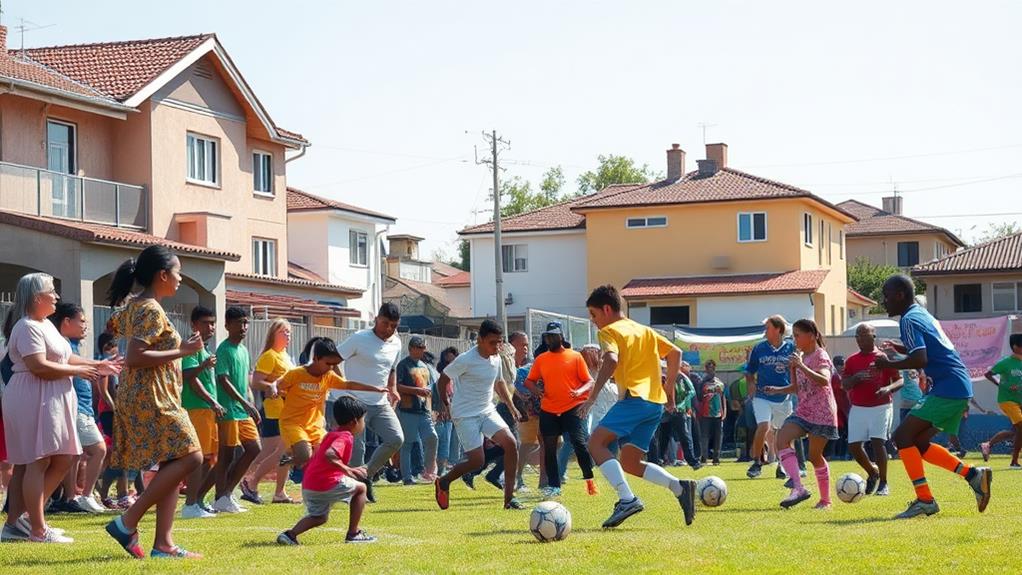Sports Foster Inclusivity and Social Connections
Engaging in local sports programs brings together individuals from diverse backgrounds, creating opportunities for friendship and mutual respect.
For instance, a community soccer league can unite people of different ages, ethnicities, and socioeconomic statuses, promoting a sense of belonging and breaking down social barriers.
Team Sports Develop Essential Life Skills
Participating in team sports helps individuals develop critical life skills like collaboration, discipline, and communication.
These skills are essential for success in both personal and professional life. For example, working together as a team to achieve a common goal in a sport like basketball can translate to effective teamwork in the workplace or classroom.
Sports Boost Self-Esteem and Confidence
Regular participation in sports can significantly enhance self-esteem and confidence.
As individuals achieve their goals and receive recognition, they develop a more positive self-image, leading to increased motivation and overall well-being.
Athletic Events Unite Communities
Athletic events often rally communities around shared goals, sparking unity and social change.
For example, a charity run can bring together people from different neighborhoods to support a common cause, fostering a sense of community and promoting social cohesion.
Sports Transform Individuals and Neighborhoods
By lifting marginalized voices and celebrating cultural diversity, sports have the power to transform individuals and neighborhoods.
For instance, a community sports program can provide opportunities for underprivileged youth to develop their skills, build confidence, and gain access to educational and career opportunities.
Community Connection Through Sports

Sports: A Catalyst for Community Connection
Sports programs serve as a strong catalyst for community connection, creating common ground for diverse groups to interact and engage. These interactions foster mutual respect, allowing individuals to see beyond cultural boundaries and build relationships that transcend race, religion, and socioeconomic status.
For instance, local youth sports leagues bring together children from different backgrounds, promoting understanding and friendships.
Participation in Sports Fosters Social Networks
Participating in sports enhances social networks, promoting a sense of belonging and collective identity. When you join a local league or participate in a friendly competition, you're not just playing; you're forming connections that can last a lifetime.
Community sports events, such as charity runs or basketball tournaments, facilitate the formation of new friendships and strengthen existing bonds among participants.
Sports Promote Social Inclusion
Engaging in sports activities is vital for social inclusion, especially for marginalized groups. Sports provide opportunities for marginalized groups to connect with others, improving representation within the community.
For example, adaptive sports programs for individuals with disabilities promote social integration and break down barriers.
The social impact of sports participation can't be overstated; it not only brings people together but also strengthens communities as a whole. By participating in sports, you're actively contributing to a more connected and inclusive environment for everyone.
Promoting Inclusivity in Sports
Inclusive sports communities are crucial for building stronger, more unified communities. When sports leagues and programs welcome individuals with disabilities, they foster a sense of unity that enhances community development.
For example, adaptive sports leagues and unified programs not only increase participation rates but also create environments where everyone feels valued.
Inclusive practices in youth sports initiatives have a significant impact on social skills and self-esteem. Research shows that prioritizing inclusivity in youth sports enhances social skills and self-esteem, benefiting participants from diverse backgrounds.
This is because inclusive sports environments provide opportunities for children to interact with peers from different backgrounds, fostering empathy and understanding.
Inclusive sports communities can boost overall participation rates. By adopting inclusive practices, community sports organizations can increase participation rates by up to 30%.
This diversification enriches the sports culture, making it more representative of the community. For instance, events like the Special Olympics promote mutual understanding and acceptance amongst all participants, serving as a powerful reminder of the importance of inclusivity.
Empowering women and girls through sports is essential for gender equity and community well-being. Girls involved in sports are 1.5 times more likely to pursue leadership roles in their communities, further enhancing overall well-being.
By participating in inclusive sports, women and girls can develop leadership skills, build confidence, and become role models for others.
This, in turn, contributes to a healthier, more unified community.
Developing Life Skills via Sports

Sports play a vital role in developing essential life skills that extend beyond the playing field. By participating in sports, individuals not only enhance their physical health but also cultivate important abilities that benefit their personal and professional life.
Teamwork and Communication: When individuals participate in team sports, they learn to collaborate with others, communicate effectively, and understand different perspectives. For instance, in basketball, players need to work together to execute a play, which requires clear communication and mutual understanding.
Discipline and Time Management: Balancing sports training and competition with other responsibilities, such as schoolwork or a part-time job, instills discipline and prioritization skills in daily life. For example, a student-athlete must manage their time wisely to attend practice, complete homework, and study for exams.
Leadership and Resilience: Taking on leadership roles in sports teaches individuals how to motivate others and make decisions under pressure while overcoming challenges. A team captain, for instance, must motivate their teammates during a tough game and make strategic decisions to win.
Engaging in sports fosters perseverance, enabling individuals to tackle obstacles in various aspects of life.
Studies have shown that youth involved in sports exhibit higher self-esteem and confidence, which positively impacts their social interactions and overall mental health.
By developing these life skills, individuals not only contribute to a stronger community but also position themselves for better health and success in future endeavors.
Ultimately, sports empower individuals to navigate life's complexities with confidence and resilience.
Economic Contributions of Sports
Sports events have a profound impact on local economies. When major sports events occur, they attract visitors, generating significant tourism revenue. For example, the 2016 Rio Olympics brought in an estimated $3 billion in visitor spending. This influx not only boosts local businesses, such as restaurants and hotels, which can see a 20-30% increase in sales during major games, but also enhances community facilities.
Sports infrastructure development creates job opportunities. The construction and maintenance of sports complexes lead to a reported 30% increase in local employment. Sports organizations often invest in infrastructure that benefits the community long-term, improving the overall quality of life.
Regular sports events contribute to sustained economic growth, encouraging ongoing investment in local economies.
Sports teams engage in charitable initiatives, directing portions of their revenue toward local nonprofits, which bolsters community development efforts.
By supporting sports, you're investing in a healthier, more vibrant local economy.
How Do Sports Facilities Contribute to Community Development?
Sports facilities play a crucial role in the development of a community by providing a space for physical activity and social interaction. The importance of sports facilities in promoting healthy lifestyles, fostering a sense of community, and offering opportunities for skill development cannot be overstated. These facilities contribute to the overall well-being of a community.
Social and Cultural Impacts

Sports have a profound impact on society and culture, extending beyond their economic benefits. They unite communities, fostering social cohesion and creating bonds among diverse groups. This sense of unity and belonging stems from the power of inclusivity and teamwork that sports inherently promote.
Sports celebrate cultural diversity by showcasing athletes from various backgrounds, promoting acceptance and representation. The Olympics, for example, bring together athletes from around the world, highlighting their unique backgrounds and promoting global understanding.
Participating in sports has a positive impact on mental health by elevating community morale, instilling resilience, and reducing stress. This leads to improved mental health outcomes and a more positive community atmosphere.
Local sports initiatives often target specific needs, enhancing social networks and providing opportunities for marginalized groups. These initiatives strengthen community engagement and promote social connections among participants and spectators alike.
Friendly competitions and community sports events not only provide entertainment but also strengthen community identity and create lasting connections.
Sports as a Tool for Empowerment
Sports Empower Marginalized Groups
Sports have the power to transform lives, especially for marginalized groups. Participating in sports fosters self-esteem and confidence among individuals, particularly girls and women. Sports programs like Women Win illustrate how sports can uplift disadvantaged girls, enabling them to challenge societal norms.
These programs provide a platform for girls to develop valuable leadership skills that can translate into educational and professional success.
Adaptive Sports Promote Independence and Self-Worth
Adaptive sports programs empower individuals with disabilities, promoting independence and self-worth. These initiatives enable athletes to break barriers and showcase their abilities, inspiring awareness within the community about the capabilities of individuals with disabilities.
By participating in adaptive sports, individuals with disabilities can develop a sense of accomplishment and confidence, challenging stereotypes and misconceptions.
Sports Mobilize Communities for Social Change
Sports have the power to mobilize communities around pressing social issues. Athletic events raise awareness and inspire collective action, promoting teamwork and inclusivity.
Questions and Answers
How Do Sports Impact the Community?
Sports promote social inclusion and community engagement through youth athletic programs that bring people together. For example, local sports leagues provide opportunities for children to make new friends and develop teamwork skills.
Community pride and a sense of belonging are fostered when local teams compete. This is evident when community members come together to cheer on their local teams, creating a shared sense of excitement and pride.
Regular sports participation improves physical and mental well-being, contributing to a healthier population. For instance, playing sports regularly can reduce obesity rates, improve cardiovascular health, and alleviate symptoms of anxiety and depression.
Sporting events stimulate economic growth by generating revenue for local businesses. For example, hosting a major sporting event can bring in millions of dollars in revenue from ticket sales, concessions, and hotel bookings.
Additionally, these events provide volunteer opportunities, further enhancing community connections and resilience.
What Is Community Development in Sports?
Community development in sports involves fostering community engagement and social inclusion through various initiatives.
Youth development is a key aspect, as sports programs often create volunteer opportunities and mentorship for young people, such as coaching, refereeing, or administrative roles.
These activities promote health benefits by encouraging physical activity and healthy lifestyles, while also boosting the local economy by drawing participants and spectators to events, which can facilitate cultural exchange among diverse groups.
For example, a sports tournament can attract visitors from different cultural backgrounds, promoting cross-cultural understanding and exchange.
How Do Sports Bring Communities Together?
Sports unite communities by creating a shared sense of purpose. When individuals participate in sports, either as players or spectators, they become part of a larger collective. This collective identity fosters a sense of belonging and encourages local engagement.
Youth involvement in sports promotes social integration and cultural exchange. For example, when children from different backgrounds come together to play on the same team, they learn to appreciate and respect each other's differences. This exchange helps break down cultural barriers and promotes understanding.
Sports also promote health and well-being. Regular physical activity improves overall fitness, reduces stress, and boosts self-esteem.
Additionally, sports create volunteer opportunities that strengthen community ties. Many sports events and teams rely on volunteers to organize and operate successfully. These opportunities bring people together, fostering a sense of community and collective responsibility.
Ultimately, shared sports experiences unite individuals and foster a collective identity. By participating in sports, individuals become part of something bigger than themselves, creating a sense of belonging and community pride.
What Is the Role of Sports in Society?
Sports Foster Athletic Identity and Social Cohesion
Sports play a vital role in society by fostering athletic identity through participation in various sports teams and leagues. This identity helps individuals develop a sense of belonging and self-esteem.
Moreover, sports promote social cohesion by bringing people together, regardless of their backgrounds, to cheer for their favorite teams or players.
Sports Develop Teamwork Skills and Lasting Friendships
Sports engage youth in various activities that encourage teamwork skills, such as communication, coordination, and mutual support.
These skills are essential in building lasting friendships that extend beyond the playing field. For instance, teammates often develop strong bonds, which can lead to lifelong relationships.
Sports Offer Significant Health Benefits
Regular participation in sports reduces chronic disease risks, such as heart disease, diabetes, and obesity.
Additionally, sports enhance overall well-being by improving mental health, increasing energy levels, and promoting better sleep.
Sports Have a Substantial Economic Impact
Sports generate significant revenue through local events, which drive visitor spending on accommodations, food, and merchandise.
For example, hosting a major sports tournament can attract thousands of visitors, resulting in a substantial boost to the local economy.
Sports Facilitate Cultural Exchange and Celebrate Diversity
Sports provide a platform for cultural exchange, allowing athletes and spectators to share their experiences and traditions.
This exchange enriches communities by promoting cross-cultural understanding and appreciation.
Moreover, sports celebrate diversity by bringing together people from different backgrounds and nationalities to share their passion for a particular sport.